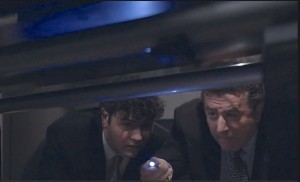Leverage Sunday: The Nigerian Job by John Rogers & Chris Downey: Creating a Community
Setting up a community isn’t easy; getting that many people on the page or screen and keeping them all individualized while combining them into a unit normally takes some time, a slow build so that the reader or viewer can get to know each member as the team gradually bonds. Some series–Person of Interest and Arrow, for example–do this over many episodes, adding one member at a time. And then there’s Leverage, a show that dropped five loners into the first episode, fused them into a unit, and never stopped running. The pilot for the series is a great tutorial on how to create a team very quickly while individualizing all its members.
1. Start with the leader.
Even in a team of equals, there has to be somebody in charge, and that leader is crucial because he or she is going to give the group its identity. But because the leader has so much more power than the rest of the group, it’s important to give him or her weak spots so that the group can challenge authority and keep the group identity fluid and the power dynamic equal. In Leverage, the mastermind is Nate Ford, a former insurance investigator, now broken by the death of his son and the collapse of his marriage, drinking himself to death to dull the pain. But Nate isn’t just any insurance investigator; he’s a legend, traveling the globe to track down missing valuables, part of a symbiotic community of detectives and thieves who circle around each other constantly. That means that Nate has intelligence, skills, knowledge, and connections, things that would make him invincible if it weren’t for that drink in his hand.
All of that is set up in the first scene as he’s approached in an airport bar by Victor Dubenich to steal back plans that have been stolen from him, offering Nate both money and revenge on the insurance company that refused to pay for Nate’s son’s treatment, the real chink in his armor of indifference. Nate is the first to be hired, so he’s the only team member in the scene, and the viewer’s full attention is on him. That’s crucial because he’s the one who’s going to define the group, so he has to be established first. The script lampshades Nate’s identity by having Victor tell him that he’s hired three thieves, so now he needs an honest man to lead them.
That “honest man” designation is going to be Nate’s hallmark for the first two seasons, his insistence that he’s not a thief setting him apart from the rest of the cheerfully criminal group until the second season finale when he finally comes to terms with the man he has become, and when asked to identify himself, says, “I’m Nate Ford and I’m a thief.” Possibly a better tag comes from Sophie when she asks him if he doesn’t like being a black king better than a white knight, being the leader of a criminal gang rather than working for somebody else as a good guy, but the truth is he’s both, and that informs the entire crew. Nate now works outside the law to do the good things he did before while his crew now does good things, working outside the law as they’ve always done. They’re all white knights now because they follow Nate’s black king, but because as the series progresses, they all take turns calling the shots, and because Nate becomes part of the team’s community, the black king/white knight designation becomes the team description, too.
2. Add more team members, but make them wildly different from each other, then set them to arguing among themselves to highlight those differences. The next three members of the team arrive all at once and are instantly differentiated in appearance, skill sets, and personality. A black man, a white man,and a woman. A hacker, a hitter, and a thief. An easy-going, good-time guy; a taciturn, brooding guy; a child-like crazy woman. As the series continues, the writers can add layers to these cartoons, making them into complex characters, but in the beginning, the team members need to be as different as possible, no subtlety.
3. Put the team in action right away, before they know each other so they learn each other’s strengths on the job rather than having talking heads explain them to each other. Scenes that have people explain who’s who on the team are useless because nobody remembers words alone, they remember words-and-pictures. Leverage drops three strangers into a computer heist, gives each one a very brief flashback to nail their pasts, and then shows them in action doing what they do very well, imprinting each character distinctly in the viewer’s mind. Then things go wrong and Nate tells them what to do, and together they improvise to finish the job, foreshadowing that they’ll be a team even though each one states clearly that he or she prefers to work alone and the leader prefers not to work with any of them at all.
4. Then put them in a crucible. A team can form slowly over time, learning to trust each other, or they can be melded in a blast furnace of outrage and revenge. An the beginning of the episode, the Leverage team is emotionally distant from each other, brought together for one job only by external forces and the promise of a paycheck, but at the first turning point, they’re put into a crucible–the bad guy cheats them and then tries to blow them up–that gives them a shared emotional goal. By the end of the first episode, they’ve formed a community they’re determined to keep, even if they have to convince their mastermind to keep minding them.
5. Add new members once the basic team is established, but make sure the new member is different from the existing members: different appearance, different skill set, different personality, and must bring something new to the dynamic. In this group, the new kid is Sophie the grifter, an older brunette woman with a seductive personality, the opposite of the other woman in the group, the younger, blonde, socially stunted Parker. Sophie is different in one other respect: she’s the only member of the group chosen by Nate because he’s chased her around the world to recover the things she’s scammed, so he knows how good she is. She’s not only the wild card in this episode’s con, she’s the wild card in Nate’s life.
6. Make sure your stories showcase how the team works together, supporting each other, how, in short, they’re a community, a family. The fun in the Leverage pilot isn’t just in the twisty plot, it’s in watching loners discovering they like working together, a group romance, if you will.
7. Show that the community has a group identity that the individual members value and want to keep. The Leverage pilot did one other thing that was crucial for this team: at the end of the episode it’s revealed that they didn’t just take the bad guy down, they profited from it. Because Hardison is a genius at playing the markets, he can hand every member of the team a huge check, big enough for each of them to retire for life. That means when they follow Nate down the street explaining why they should keep working together, it’s not for the money, it’s because they want to keep the community. The Leverage team pulled their cons for five seasons, but every one rested on the bonding that happened in this first episode.
How They Did It: Plot Analysis:
The community is plot is developed in tandem with the caper plot, each interlocking with and fueling the other.
Act One: I’m Only In This For The Money and I Don’t Like Any of You
The first fifteen minutes is the First Job, Victor hooking Nate, and the team stealing the plans and dropping a virus into the rival’s computers. Hardison, Parker, and Eliot are arguing and resisting Nate’s leadership in the beginning to the point that when things go south, Eliot says “You’re on your own” and prepares to desert them, but by the end when Nate gets them out of trouble, they’re working well together, and it’s all shown in the execution of the theft, the two plots unspooling simultaneously.
The Change of Plans: That Bastard Tried to Kill Us
The first turning point comes when they don’t get paid and Victor tries to blow them up. That swings the caper narrative around from a “Steal back the plans” plot to a “Get even” plot, and the community plot from “this is a one time job” to “let’s work together to get this jerk.” Same characters, new stories.
Act Two: Get Sophie
There’s a nice moment when loner Eliot stops to help a fallen Hardison right before the building blows, especially nice since Hardison had pulled a gun on him only minutes before, but they’re still not a team. That’s demonstrated in the hospital when the three thieves tell each other that they don’t trust any of them. Nate says, “Do you trust me?” and there’s silence until Eliot says, “Of course. You’re an honest man.” Ten minutes later, they’ve escaped and they’re back at Hardison’s place, ready to run, when Nate says, “We can take him,” and after a moment’s thought, all three are back on the team, this time with a common goal to bring down Victor. His team under control once again, Nate makes a final team-building move, getting them a face Victor hasn’t seen: “Let’s go get Sophie.”
The Point of No Return: Let’s Go Break the Law One More Time.”
The mid turning point is when they leave the apartment and put the plan into motion, going into action they can’t retire from. Act Two was the story of four people who’d been attacked and betrayed saving themselves and each other and then agreeing to work together one last time; Act Three will be the team of four plus one in action, changing the plot from “plan” to “execution” and the community from four to five.
Act Three: Get Victor
The Third Act is the Second Job, the team of five eating popcorn and making plans, Sophie and Eliot surprising each other by their common knowledge of a small and evidently hinky town on the Chinese border, Nate surprising everybody with his knowledge of airplanes, all of them beginning to realize the talent they’re surrounded by. The rest of the act is setting up Victor, playing out the scam, problem solving when they hit snags, all of which is new for each one of them and awakens them to the possibilities inherent in teamwork; my favorite example of this is Sophie’s moment of terrified bonding with Parker on the zip line.
The Crisis: Victor Gets Them
The third turning point is when Victor tells his assistant he’s on to them and he’s setting a trap. This is where Leverage cheats in every episode; you watch the team set up the con, but you never have all of the information, which in this case is that Victor’s discovery of their plan is part of their plan. If you know that, all of the tension goes, but if you don’t know that, it’s a cheat since you’ve been part of the team. Normally, I’d be raising hell about this, but I buy it in Leverage: those people lie to everybody, so of course they lie to me. What this TP does for the viewer is change the story from Our Team Is Going To Get Revenge to Our Team Is Going To Get Arrested. The story doesn’t change for the characters, it changes for the viewers.
Act Four: The Biter Bit
Victor springs his trap only to get caught in it by the team’s double con, each part of the plan toppling like dominoes as he tries frantically to stop the fall, while they walk out of the building with files, all dressed alike, a unified team. That is, they come together as Victor falls apart.
The Climax: “I Can Take Your Underpants”
In the caper plot, Victor is utterly and completely defeated and is hauled away by the FBI as Nate returns the stolen plans to his rival along with evidence that Victor was behind the theft.
In the community plot, Hardison passes out checks that give them each enough to retire on, and then the team, in a 180 turn from the first act, tries to convince Nate to stick with them because they want to keep the community and they know it can’t work without him. He tries to walk away, but there’s Sophie, purring “Black king, white knight” at him.
The Denouement/Resolution: We Provide Leverage
The next thing the viewer sees is the new stable world the plot has arced toward, the team talking with a couple in trouble, explaining that they understand that the couple is under a terrible weight, and that what they do is provide leverage to lift that weight. It’s important that its not Nate meeting with this couple alone; Sophie speaks first, then Nate, but all five of them are in the room, clearly a unified community.
Community Status: “This Could Work.”




















